|
In the Spanish Harlem district of New York City, detectives Dan Madigan (Richard Widmark) and his partner Rocco Bonaro (Harry Guardino) bust in the door of an apartment occupied by small-time crook, Barney Benesch (Steve Ihnat), catching him in bed with his young girlfriend Rosita (Toian Matchinga). Benesch is wanted for questioning by the Brooklyn Precinct, and as he is well known to Madigan and Bonaro, they've volunteered to pick him up as a favour to their colleagues. Benesch initially seems cordial and cooperative, but when he asks Rosita to fetch his coat, the detectives are momentarily distracted by her nudity, allowing Benesch to grab his gun and relieve the two detectives of their weapons, then locking them both on the apartment block roof and making his escape.
The news that Madigan and Bonaro have not only allowed Benesch to give them the slip but also to take their guns does not impress Police Commissioner Anthony X. Russell (Henry Fonda), and the situation worsens when confirmation arrives that Benesch is now wanted for murder. By then, Russell has a serious problem of his own, having been presented evidence by Assistant Chief Inspector Earl Griffin (Lloyd Gough) that his close friend and associate, Chief Inspector Charles Kane (James Whitmore), is involved in criminal activity. While he makes up his mind what to do with these revelations about a man he grew up with and regards almost as a brother, Russell continues to attend to his regular duties. Today, this includes representing the department at a charity event and meeting respected local black minister, Dr Taylor (Raymond St. Jacques), who claims that his son was unjustly arrested, and that he was so heavily pressured to confess to a crime that he did not commit that he returned home in a state of mental anguish and collapse. Adding to the piling pressure on him is the affair he has been having with the married Tricia Bentley (Susan Clark), which is increasingly at risk of being brought an end by Tricia, who remains torn between him and her husband and children. Madigan and Bonaro, meanwhile, have been given 72 hours to find and arrest Benesch, and start by tracking down diminutive bookie, Midget Castiglione (Michael Dunn), who likes to keep tabs on Benesch's whereabouts after being robbed and beaten by him in the past. All of this stresses Madigan's relationship with his less-than-understanding wife, Julia (Inger Stevens), who is obsessively insistent that they attend the upcoming departmental Captain's Dinner, despite the disruptive effect doing so could have on her husband's efforts to track down Benesch.
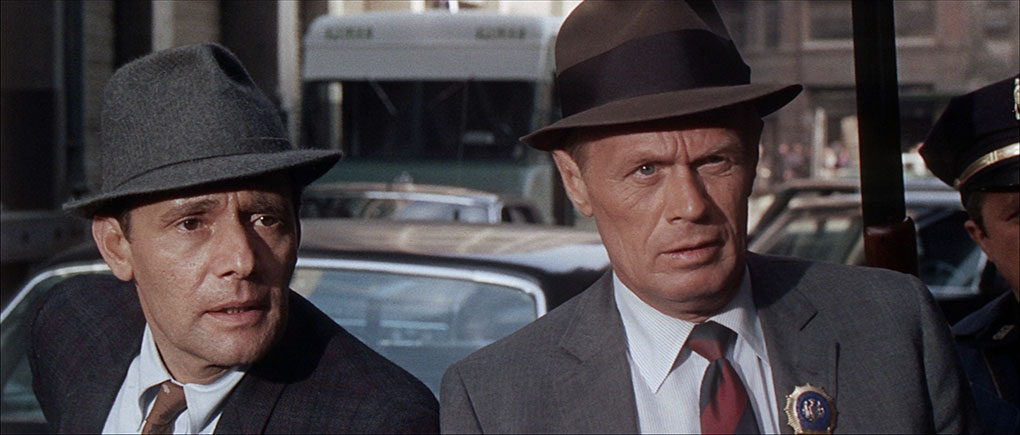
I seem to be using the word 'transitional' a lot in my recent disc reviews, almost as often as the contributors to the special features of the titles in question. The films to which this label can aptly be applied certainly seem to be of particular interest to independent labels like Indicator and Eureka, and while they definitely also are to me, I'm at risk of repeating myself when several such films land Blu-ray releases in quick succession, as they have of late. But if the shoe fits... Madigan was made on the cusp of an upsurge in the popularity of the American police drama/thriller, something its director Don Siegel was to prove instrumental in spearheading, first a few months later with Coogan's Bluff, and then in 1970 with the genre-defining Dirty Harry. That Madigan also has elements of the old-school American cop dramas of years past is most clearly visible in detectives who dress in the manner of their 1940s and 50s counterparts, with Fedora hats as much a part of their uniforms as their sober jackets and ties. But in common with a good many of the films that followed, there is a focus here on everyday police legwork and the home lives and emotional issues of the cops in question. There's also a brutally unglamorous approach to violence that apparently drew some criticism on the film's release but was certainly a sign of things to come, despite a still restrained attitude to realistic bloodletting. Changing times are also reflected in the strait-laced widower Russell's secretive affair with the happily married Tricia, which is echoed by Madigan's relationship with nightclub singer Jonesy (Sheree North), a former girlfriend whose company he seeks when emotionally drained, but with whom he declines to sleep because he loves his wife. Where movie tradition is upheld is in the age gap between the male leads and their respective female partners, with Dan about 20 years older than both Julia and Josey, while Russell has a good 30 years or so on Tricia. Funny how you rarely saw that age difference reversed in American movies, and when you did it was usually acknowledged and even made a central plot point of the movie, eh, Mrs Robinson?
In some ways, Madigan is a maverick cop of the 1970s in the making, a detective prepared to bend the rules to get what he wants and who eventually gets results, but who nonetheless has a talent for rankling his superiors. That said, Russell's irritation at hearing Madigan was one of the cops who lost their guns – "Damn that Madigan. He was bound to get caught in the wringer sooner or later" – is nothing compared to the mocking sarcasm dished out by his Lieutenant (Frank Marth), and the angry condemnation of Chief of Detectives Hap Lynch (Bert Freed), who's all for filing an official complaint against him and his partner. Lynch also – in an almost throwaway remark – hints that if news of this reached the press, then it wouldn't be the first time these two detectives hit the headlines. And you can read what you like into the fact it's the compromised Kane who regularly comes to their defence, citing their success rate and noting that they are two of the most highly decorated officers in the department.
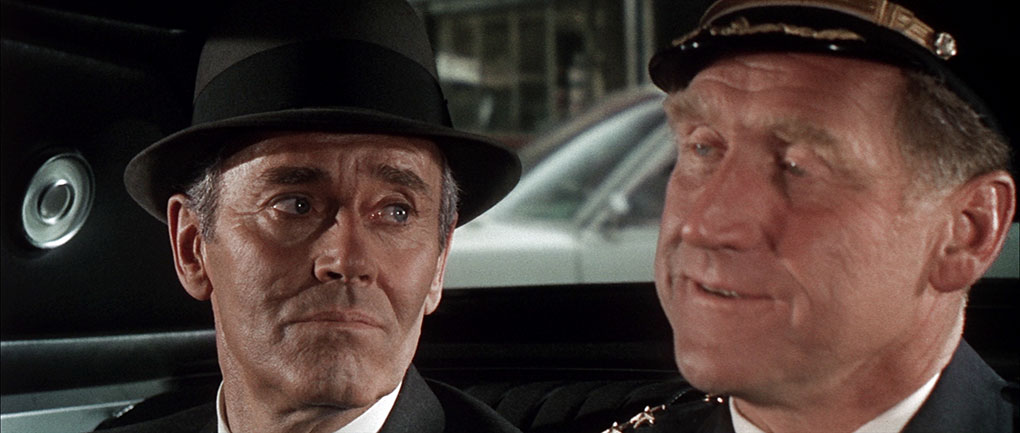
As is sometimes the way with rule-breaking detectives, the titular Madigan is not a particularly sympathetic individual, being instead someone we initially form a bond with because of his plight – an easy mistake that could ultimately have serious consequences – rather than his sometimes acerbic personality. In this respect, you couldn't cast better than Richard Widmark, an actor with oodles of onscreen charisma but who could effortlessly work a cynical sneer into even the sincere declaration of love if he chose to do so. It's certainly easy to sympathise with his frustration at being outsmarted and robbed of his gun by a hoodlum like Benesch, and to feel for him as he is mercilessly mocked by his Lieutenant or badmouthed by his superiors. Yet that sympathy soon starts to slip when he and Bonaro pay a visit to Castiglione's workplace and gain access to his private office by coldly threating to tip a heavy oak desk onto his terrified secretary. Every bit as perfectly cast is Henry Fonda as the stoically rule-observant Commissioner Russell, a man who takes the news that his close friend is on the take with a display of surface calm but fails to keep his irritation in check when he hears that Detective Madigan has messed up again.
That the film gives the stories of both men equal weight proves a distinctive feature in a subgenre where the lead character's superior officers were usually consigned to adversarial supporting roles. Here the two men are effectively shown to be flipsides of the same coin – both are seasoned policemen, but while one is a street cop who has no problem breaking a few rules to get results, the other is an office-based manager who does things by the book. Unlike the buddy cop films of later years, the two do not learn from each other or absorb aspects of the other's way of thinking, though when faced with possibly having to charge his old friend with a crime that will finish his career, the straightlaced Russell finds – perhaps for the first time – that doing what is technically the right thing is not always as easy as he has come to believe. The two rarely meet but do so most tellingly when they bump into each other at the Captain's Ball, which Madigan theoretically has no time to attend and is only there to pair Julia off with a single colleague for the evening. As they hesitantly converse, the language of their interaction – Russell calls Madigan by his first name, while Madigan addresses Russell as 'Commissioner' – and the fact that Madigan speaks with the awkward embarrassment of a child that has been caught playing truant speaks volumes about their past history and professional relationship. In the final scenes, Russell is directly confronted about his coldness by another character (I'm avoiding spoilers here) in an emotional outpouring that contrasts starkly with the Commissioner's bureaucratic aloofness. It's one of the film's most effective sequences, and a short while later it's suggested that the accusations thrown at him have actually had some impact.
While Madigan lacks the fish-out-of-water culture clash of Coogan's Bluff or the iconic handgun, quotable dialogue, and extremity of action on both sides of the law that were central to the success of Dirty Harry, it still delivers in spades in its characters, its both-sides-of-the-fence storyline, and the top-notch performances of its leads. There's some equally fine work in the strong supporting cast, with James Whitmore really impressing as Kane, while the then young Don Stroud shines in an early role as small-time hustler Hughie. And while Swiss-born actor Inger Stevens may initially seem to be saddled with a thankless role as Madigan's seemingly self-centred and nagging wife Julia, when she gets her moment, she comes close to stealing the film from under the noses of the leads.
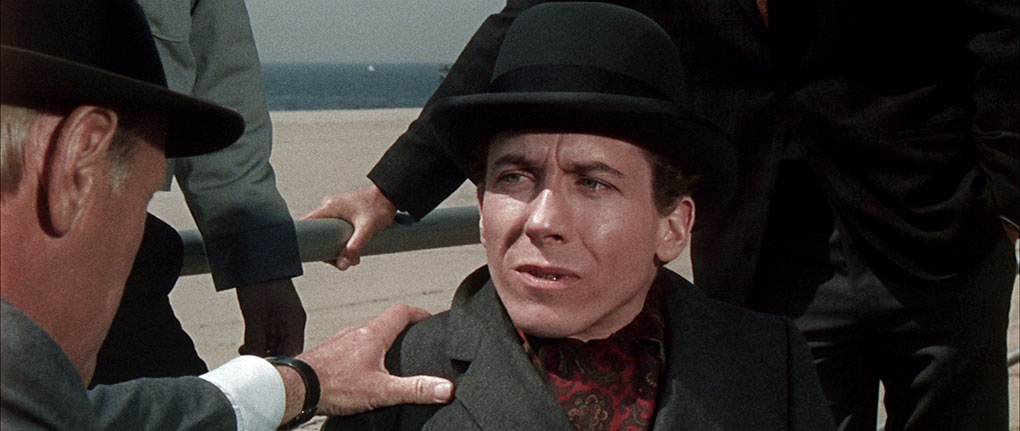
Some aspects have dated a little due to changing times and over-familiarity, notably the Good Cop/Bad Cop routine that Madigan and Bonaro pull on Hughie, a trick that he instantly falls for but would see through in a minute if the film was remade today. The air of realism also takes a bit of a dent in a late scene in which a gunman is holed up in a hotel room, and cops stationed on nearby rooftops fire blindly through the window with shotguns and rifles without a thought for the poor young woman he is holding hostage. However, this does lead to a sequence whose forward-looking nature surprisingly gets no mention in the on-disc special features, when Madigan, Bonaro and the man they are trying to take down all open up on each other with a pistol in each hand, prefiguring by a couple of decades one of the signature features of the early crime thrillers of celebrated Chinese director, John Woo.
I'm assuming that the 1080p transfer on Indicator's Blu-ray was sourced from a Universal remaster, and as you would hope, it's a very solid job. Framed in the film's original aspect ratio of 2.35:1, the image has a toned-down look to its colour that was clearly shaped at the shooting stage in the choice of costumes, the production design, and even in the paintwork of the cars, all of which present New York as a city still escaping from years of monochrome movie presentation. When brighter colours do make an appearance – the blue gown Julia is wearing in the hotel room before the Captain's Ball is a good example – they are attractively rendered. The contrast is nicely pitched, really nailing the black levels (an establishing shot inside a subway station sees the track and train swallowed in a chasm of darkness) but keeping all the essential detail clear, detail that is very well defined throughout. There's a very fine film grain and dust spots are very rare, and while there is some very small movement of the image within frame on some shots, you'd have to be looking for it (I was) to really notice it.
The Linear PCM 1.0 mono soundtrack is in good shape, understandably lacking any serious bass and the sort of crispness that you'd expect from a more modern work, but the dialogue, music and sound effects are all clear.
Optional English subtitles for the deaf and hearing impaired are available.
Audio Commentary with Barry Forshaw and Kim Newman
I've given up wondering whether writers and movie devotees Barry Forshaw and Kim Newman are on an Indicator retainer, and a quick check reveals they have been engaged for several more commentaries on upcoming releases. Instead, when I see their names listed on the special features, I just look forward to their always engaging and enlightening banter, despite their habit of echoing much of what I, by then, have just written, often from a very similar angle. I really ought to watch the extra features before putting finger to keyboard. Areas of discussion here include the notion that this is a transitional film (told you), the symbolic role of the detectives clothing (that's another one, dammit), director Don Seigel, the key actors and their performances (Newman notes, "I think Richard Widmark just brings so much to the character by being Richard Widmark"), the mix of location and studio backlot shooting, how changing public attitudes to the police were reflected in movies, and a whole lot more. As ever, Newman has read the source novel (by Richard Dougherty) and is able to highlight the changes made for the film, and both men note the similarity between the incident that kicks off the story to the one central to both Kurosawa 1949 Stray Dog [Nora inu] and Walter Hill's 1982 48 Hrs. Particularly intriguing is the suggestion made that Richard Widmark could have played Popeye Doyle in The French Connection (1971) but not Dirty Harry, and the two sign off with the opinion that if you're a fan of Don Siegel, this is essential viewing. No argument here.
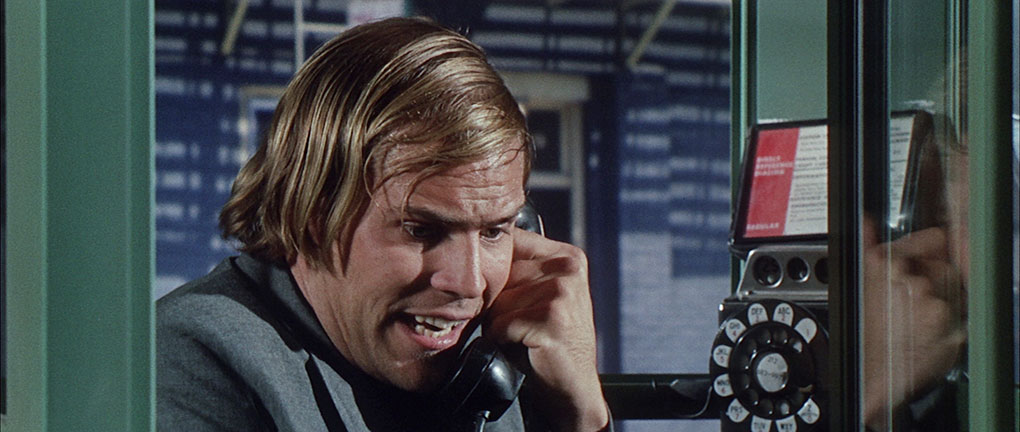
Cinéma cinémas: Richard Widmark (7:24)
A brief but welcome extract from what I presume was a French TV series on cinema, which consists of an interview conducted with Richard Widmark in Hollywood in May of 1983. He lists John Ford, Elia Kazan, and Henry Hathaway as his favourite directors, and notes that Don Siegel and Sam Fuller became cult directors after he made films with them, but in a voice that suggests he's a little bemused by the whole notion of cult films and filmmakers. He outlines what defines a good director for him and claims that most of them know nothing about acting, then makes an exception for Elia Kazan, probably because as he was once one himself.
Super 8 Version (17:54)
This Super-8 version of the film released for home viewing cuts the film down to less than a fifth of its original length and thus plays more like a highlights reel, one cropped to 4:3 and almost completely age-drained of colour. Unsurprisingly, the changes strip the film of swathes of its narrative, completely removing the story of Charles Kane's corruption and effectively relegating Russell to a supporting character. The investigation to locate Benesch requires only the Coney Island meeting with Castiglione and the interrogation of Hughie, and the last three minutes of the film are also gone, removing a key verbal confrontation, and ending the story on an ambiguous note. Particularly odd is the inclusion of a new line of dialogue in the opening raid on Benesch's apartment, which is delivered off screen by someone pretending to be either Madigan or Bonaro: "Sorry to break in on you and your wife, Barney." Hard to believe that even in the early 1970s, when I presume this version was released, somebody thought it morally questionable to show a man and woman in bed together unless they were married. Then again, any hint that any of the characters are having an affair has also been soundly excised.
Isolated Music and Effects Track
As the title says. Fine for those who like this sort of thing, though it is interesting to hear which sound effects were recorded live and which were added in post.
Theatrical Trailer (2:27)
A well-enough assembled trailer with an old-school narration and a massive final text crawl that proclaims that "Madigan strips a city and its people right down to their naked lusts!" You what? In common with so many trailers to come, it includes footage from the climactic scene.
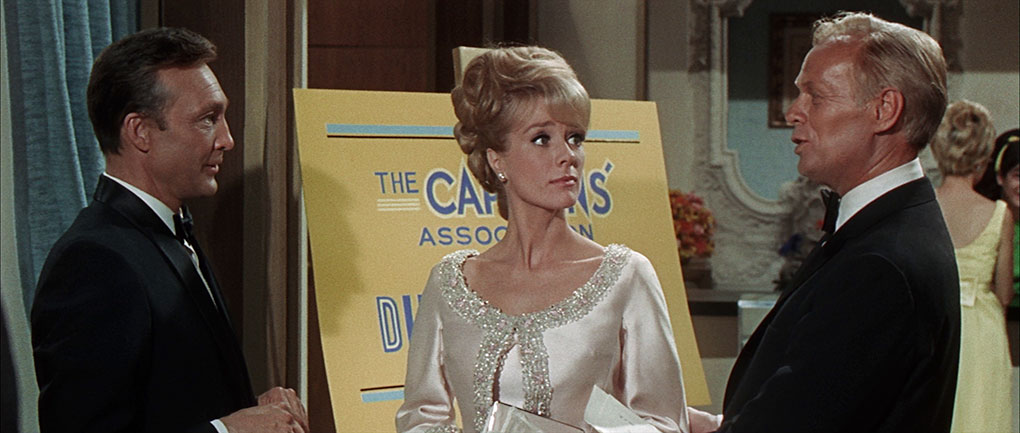
Image Gallery
54 screens of monochrome and colour promotional stills (one of which contains a major spoiler), behind-the-scenes photos, lobby cards (oh lord, those colours), and a couple of international posters.
Also included is a Limited Edition 36-Page Booklet with a new essay by Elena Lazic, an archival interview with Don Siegel, an extract from the director's autobiography, an overview of contemporary critical responses, and film credits, but this was not available for review.
On the commentary track, Kim Newman makes a really pertinent point when he suggests that Madigan would have been a very different movie had it been made just a few months later. The times for this subgenre, they were a-changing. In some ways, it marks the halfway point between the noir-influenced cop dramas of old and the more reality-based works that would become the new norm, but it also represents a significant step on a path that would lead director Siegel to Dirty Harry and the maverick cop cycle that it helped to spawn. A solid presentation of the film and some quality extras make this disc a must for fans of the director and American police dramas in general. Warmly recommended.
|